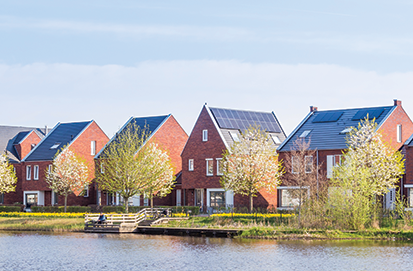The value of the hybrid heat pump for the heat transition in the built environment
Commissioned by the Ministry for Economic Affairs and Climate, Ecorys has provided insight into the technical economic effects of the hybrid heat pump as an intermediate solution (with natural gas) and as a final picture (with renewable gas).
The hybrid heat pump – a combination of an air-water heat pump and a traditional HR boiler – has its advantages over other heat solutions. For instance, it is more energy-efficient, uses less natural gas/green gas and does not require extensive insulation of the house, where low-temperature solutions like a full electric heat pump or a LT heat network do. However, this technique also has disadvantages: investment costs are higher than for the traditional HR boiler, it still requires the use of (renewable) gas, and it therefore requires maintaining two energy infrastructures side by side.
The study concerns a techno-economic cost and scenario analysis of different paths towards a sustainably heated built environment. The basis for this analysis was the existing study ‘Start analysis natural gas-free neighbourhoods 2020′ by the Netherlands Environmental Assessment Agency and Ecorys’ deployment of the Vesta MAIS calculation model.
There are four main conclusions:
- The hybrid heat pump (in combination with natural gas) has no lock-in when properly deployed.
- The hybrid heat pump (in combination with green gas) is of above-average interest in rural areas with spaciously designed residential areas (detached and semi-detached houses) and where high and medium-temperature heat networks are not possible.
- The deployment of the hybrid heat pump leads to a more efficient use of green gas than with a high-efficiency boiler, allowing more users to make use of the limited amount of green gas available. By deploying the hybrid heat pump instead of high-efficiency boiler, the peak load of heat demand can be met by the limited supply of green gas for more homes, while the base load is provided by the (more efficient) heat pump.
- From a national and end-user cost perspective, the hybrid heat pump (in combination with green gas) offers cost and CO2 benefits: Because the hybrid heat pump is a more efficient system compared to the high-efficiency boiler, it is able to reduce substantial natural gas and CO2 emissions in homes with high energy consumption. This also works advantageously in annual energy costs.
The results show that the hybrid heat pump is a good complement to the deployment of other sustainability strategies, such as heat networks, through the neighbourhood-oriented approach. When no robust final solution is in sight in a neighbourhood in the next 10 to 15 years, the hybrid heat pump offers a cost-effective alternative as a regret-free solution. Not only as an intermediate solution to natural gas, but also as a final solution, the hybrid heat pump in combination with green gas is an attractive alternative.
For more information, read the research report (pdf) or the room letter from the Minister of Economic Affairs and Climate.
For more information, please contact our consultants Kurt Kreulen and Maurice Thijsen.

28 April 2021
2 minute read
Sectors
Key Experts
Kurt Kreulen
Consultant
Maurice Thijsen
Senior Consultant



